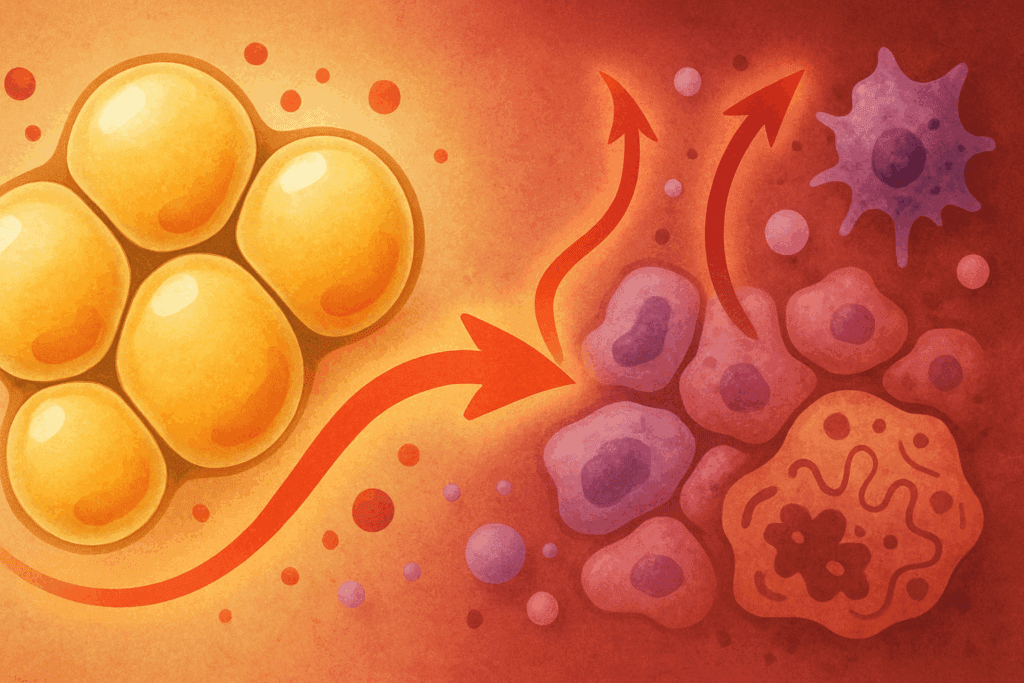Introduction: The Rising Interest in Natural Solutions for Weight Management
In an era where health-conscious living is becoming the norm rather than the exception, the quest for natural methods to support weight loss continues to capture the public’s attention. Among the myriad of options, the Reishi mushroom — also known by its traditional name, Lingzhi — stands out as a promising candidate. Celebrated for centuries in Eastern medicine, Reishi mushrooms have gained recognition in the West for their broad range of health-promoting properties. But can Reishi mushroom truly support weight loss? And how does the ancient Lingzhi mushroom intertwine with modern understandings of metabolism and fat management? These questions invite a closer examination of emerging scientific studies and centuries-old traditions, both of which frame Reishi not merely as a symbol of longevity but potentially as a helpful ally in managing body weight. In this article, we will delve into the evidence, unpack the mechanisms, and explore how Reishi mushroom weight loss benefits could offer a natural complement to broader wellness strategies.
You may also like: How Lion’s Mane Supplements May Support ADHD and Cognitive Clarity: What Science Says About Lions Mane for Focus and Brain Health
Understanding the Reishi (Lingzhi) Mushroom: A Historical and Scientific Perspective
Before evaluating its role in weight loss, it is essential to appreciate the historical and scientific significance of the Reishi mushroom. Known scientifically as Ganoderma lucidum, this fungus has been esteemed in Traditional Chinese Medicine (TCM) for over 2,000 years. Ancient practitioners dubbed it the “Mushroom of Immortality,” prescribing it to enhance vitality, promote longevity, and bolster the immune system. Reishi’s unique biochemical composition — featuring triterpenoids, polysaccharides, peptidoglycans, and beta-glucans — underpins many of its reported health benefits. Contemporary studies have corroborated several of these claims, demonstrating Reishi’s ability to modulate immune function, reduce inflammation, and act as an adaptogen to support the body’s response to stress. Importantly, these very properties intersect with pathways involved in metabolism and fat storage, thereby suggesting a plausible role for Reishi mushroom weight loss support.
The Link Between Inflammation, Metabolism, and Weight Gain
Emerging research has drawn critical connections between chronic inflammation and the development of obesity. Persistent low-grade inflammation can impair metabolic function, promote insulin resistance, and disrupt hormonal signaling involved in appetite regulation and energy expenditure. Herein lies one of the compelling rationales for considering Lingzhi mushroom weight loss potential. Reishi mushrooms possess potent anti-inflammatory properties, largely attributed to their triterpenes and polysaccharides. By mitigating inflammatory processes, Reishi may help restore metabolic balance, improve insulin sensitivity, and create an internal environment more conducive to fat loss. Furthermore, by attenuating inflammation, Reishi may also indirectly enhance physical activity levels, as systemic inflammation often contributes to fatigue and reduced exercise capacity.
How Reishi Mushroom Influences Fat Metabolism at the Cellular Level
Delving deeper into the biological mechanisms, Reishi mushroom appears to influence fat metabolism at the cellular level. Studies on animal models have shown that Ganoderma lucidum extracts can inhibit the formation of fat cells (adipogenesis) while promoting the breakdown of existing fat stores (lipolysis). This dual action provides a promising foundation for understanding how Reishi mushroom weight loss benefits could manifest. The mechanisms involve modulating gene expression linked to adipocyte differentiation and lipid metabolism, including genes such as PPAR-γ and C/EBPα. Additionally, Reishi’s antioxidant compounds combat oxidative stress, another contributor to dysfunctional fat metabolism. These findings suggest that Lingzhi mushroom weight loss effects are not merely anecdotal but may have a basis in molecular biology, offering a scientific rationale for its traditional use.

Impact of Reishi Mushroom on Appetite and Satiety Hormones
Appetite regulation is a cornerstone of any sustainable weight management strategy. Preliminary evidence indicates that Reishi mushroom may influence key hormones involved in hunger and satiety, including leptin and ghrelin. Leptin, often dubbed the “satiety hormone,” signals the brain when the body has adequate energy stores, thus suppressing appetite. Conversely, ghrelin, known as the “hunger hormone,” stimulates appetite. Dysregulation of these hormones is a common feature in obesity. Research suggests that Reishi may improve leptin sensitivity and moderate ghrelin secretion, thereby supporting appetite control. Through these mechanisms, Reishi mushroom weight loss strategies may involve not just metabolic modulation but also behavioral support, helping individuals naturally align their caloric intake with their energy needs.
Adaptogenic Properties of Reishi and Their Role in Stress-Related Weight Gain
Stress is an often-overlooked factor in weight management, yet it plays a profound role in metabolic health. Chronic stress elevates cortisol levels, promoting fat storage, particularly in the abdominal region. As a powerful adaptogen, Reishi helps the body adapt to stress by modulating the hypothalamic-pituitary-adrenal (HPA) axis. This normalization of the stress response can contribute to lower cortisol levels, reduced emotional eating, and improved sleep quality — all of which are crucial for effective weight management. By supporting emotional resilience and physical recovery, Reishi mushroom weight loss benefits may extend beyond biochemical pathways to encompass holistic lifestyle improvements.
Reishi Mushroom’s Effects on Gut Health and Implications for Weight Management
An emerging frontier in weight loss research centers on the gut microbiome. An imbalance in gut bacteria, known as dysbiosis, has been linked to obesity, insulin resistance, and systemic inflammation. Intriguingly, Reishi mushroom exhibits prebiotic-like effects, fostering a healthier gut microbiota composition. Studies have shown that Reishi extracts can increase beneficial bacterial populations while suppressing harmful species. A thriving gut microbiome enhances nutrient absorption, regulates appetite, and supports efficient metabolism, creating another avenue through which Lingzhi mushroom weight loss effects may manifest. By promoting a healthier internal ecosystem, Reishi supports the foundational processes that govern body weight regulation.
Scientific Studies and Clinical Evidence Supporting Reishi Mushroom for Weight Loss
While traditional use and mechanistic studies provide compelling arguments, clinical evidence remains the gold standard. A handful of preliminary human studies have evaluated Reishi mushroom’s role in weight management. For instance, a study published in Nature Communications found that mice fed a high-fat diet and supplemented with Ganoderma lucidum extract experienced significant reductions in body weight gain, fat accumulation, and insulin resistance compared to control groups. Although direct large-scale human studies are still limited, these animal model findings lay a promising groundwork. Moreover, smaller human trials focusing on metabolic syndrome suggest that Reishi may improve lipid profiles, reduce blood sugar levels, and enhance overall metabolic health, all of which are critical for sustainable weight loss efforts.
Safety, Dosage, and Best Practices for Using Reishi for Weight Loss
Safety is paramount when considering any supplement regimen. Reishi mushroom is generally regarded as safe for most individuals when used appropriately. Common forms include capsules, powders, and teas, with standardized extracts being preferable for consistency and potency. Typical dosages for health support range from 1.5 to 9 grams of dried mushroom per day, or the equivalent extract amount. For Reishi mushroom weight loss purposes, starting with a moderate dose under professional guidance is advisable. Possible side effects, although rare, may include digestive upset or allergic reactions. It is important to consult a healthcare provider before starting supplementation, especially for individuals taking anticoagulants, immunosuppressants, or those with underlying health conditions. Incorporating Reishi into a comprehensive health strategy that includes balanced nutrition, regular physical activity, and stress management can optimize its benefits while minimizing risks.

Practical Ways to Incorporate Reishi Mushroom Into a Weight Loss Lifestyle
Integrating Reishi mushroom into a weight management program can be both simple and enjoyable. One practical method is to incorporate Reishi tea into a daily routine, replacing sugary beverages or caffeine-heavy drinks. Reishi powder can also be added to smoothies, soups, or broths, enhancing nutrient intake without excessive calories. Supplementation with standardized capsules offers a convenient alternative for individuals with busy lifestyles. To maximize Lingzhi mushroom weight loss benefits, pairing Reishi with complementary habits — such as mindful eating, regular exercise, and adequate sleep — creates a synergistic environment for success. Furthermore, combining Reishi with other metabolic-supporting adaptogens like Rhodiola rosea or Cordyceps may amplify its effects, although professional advice should guide any such regimen.

FAQ: Can Reishi Mushroom Support Weight Loss? Exploring Lingzhi Mushroom Benefits for Metabolism and Fat Management
1. Can Reishi mushroom weight loss benefits vary based on different strains of Ganoderma lucidum?
Yes, different strains of Ganoderma lucidum can exhibit variations in bioactive compounds, influencing their effectiveness for weight loss support. Some strains are richer in triterpenoids, while others have higher polysaccharide concentrations, which may enhance different aspects of metabolism. Understanding these differences can help users choose a Reishi supplement tailored for optimal metabolic support. Individuals seeking to harness Reishi mushroom weight loss benefits should consider sourcing products from reputable brands that disclose the strain and extraction method. Customized formulations focusing on specific strains could potentially magnify the outcomes linked to Lingzhi mushroom weight loss efforts.
2. How long does it typically take to notice weight-related effects when using Reishi mushroom?
While some people may notice subtle changes within a few weeks, Reishi mushroom weight loss effects are generally gradual and cumulative. This adaptogen works by supporting metabolic balance and reducing inflammation, processes that naturally unfold over time. For most individuals, sustained use over three to six months alongside healthy lifestyle practices yields more pronounced results. Unlike quick-fix supplements, Lingzhi mushroom weight loss support encourages a foundational shift in health, which naturally takes longer to manifest. Patience and consistency are key when integrating Reishi into a long-term wellness strategy.
3. Is it better to take Reishi mushroom in the morning or evening for weight management?
Timing Reishi intake can influence its effects, although personal preference and individual response vary. Taking Reishi in the evening may enhance sleep quality due to its calming properties, indirectly supporting weight loss by regulating appetite hormones overnight. Conversely, morning use may help stabilize blood sugar and energy levels throughout the day, aiding metabolism. To optimize Reishi mushroom weight loss potential, some users split the dose—half in the morning and half in the evening—to balance daytime metabolic support with nighttime recovery. Experimenting with timing while observing bodily responses is a practical approach to maximizing Lingzhi mushroom weight loss benefits.
4. Can Reishi mushroom synergize with other natural supplements for enhanced weight loss?
Yes, Reishi mushroom can be combined with complementary natural supplements to create a synergistic effect on weight management. For instance, pairing Reishi with green tea extract may amplify fat oxidation due to combined antioxidant actions. Adaptogens like Rhodiola rosea or Cordyceps may further boost energy levels and resilience, supporting an active lifestyle essential for weight control. Strategic combinations enhance the foundational support that Reishi mushroom weight loss regimens aim to provide. However, it is essential to consult healthcare providers before combining multiple supplements to ensure safety and compatibility with Lingzhi mushroom weight loss strategies.
5. Does cooking or brewing Reishi mushroom affect its weight loss properties?
The preparation method does impact the potency of Reishi’s bioactive compounds. Brewing Reishi tea at a controlled low temperature for an extended period helps extract polysaccharides without degrading triterpenoids, preserving its metabolic support properties. High-heat cooking, however, can diminish the effectiveness of these delicate compounds. To retain Reishi mushroom weight loss benefits, traditional methods like decoction—simmering slices over several hours—remain a preferred approach. For individuals focusing on Lingzhi mushroom weight loss, standardized extracts may offer a more reliable and convenient alternative to traditional preparations.
6. Are there psychological benefits to using Reishi that can indirectly support weight loss?
Absolutely, Reishi’s adaptogenic effects extend to mental resilience, helping users better manage stress-related eating behaviors. Chronic stress can sabotage weight loss efforts by increasing cortisol levels and triggering cravings for calorie-dense foods. By promoting emotional balance and reducing anxiety, Reishi mushroom weight loss programs may address not just physiological but also psychological barriers to fat loss. Users often report improved mood stability and greater mindfulness around eating habits when incorporating Reishi into their daily routine. Thus, Lingzhi mushroom weight loss strategies can foster a holistic transformation that addresses both mind and body.
7. Could Lingzhi mushroom weight loss benefits differ between men and women?
Hormonal differences suggest that men and women might experience Reishi’s effects slightly differently. Women, particularly those experiencing hormonal fluctuations due to menstruation, menopause, or PCOS, might benefit from Reishi’s hormone-balancing properties that indirectly affect weight. In men, Reishi’s anti-inflammatory effects could particularly support better insulin sensitivity and fat metabolism. Nevertheless, Reishi mushroom weight loss benefits have been reported across genders, with personalization of dosage and timing enhancing individual outcomes. Considering hormonal health as part of a broader Lingzhi mushroom weight loss plan can lead to more tailored and effective results.
8. What lifestyle practices amplify the weight loss effects of Reishi mushroom supplementation?
Optimal outcomes from Reishi mushroom weight loss strategies arise when supplementation is paired with lifestyle interventions. Regular physical activity enhances mitochondrial efficiency, allowing Reishi’s metabolic benefits to work synergistically with increased energy expenditure. Consuming a diet rich in anti-inflammatory foods such as leafy greens, berries, and fatty fish also complements Reishi’s inflammation-lowering effects. Mindful eating practices, stress management techniques, and consistent sleep hygiene further support Lingzhi mushroom weight loss success. Integrating these healthy habits alongside Reishi supplementation creates a multi-dimensional approach to sustainable weight management.
9. Are there any emerging innovations in how Reishi is being formulated to target weight management?
The supplement industry is witnessing exciting innovations, such as nano-emulsified Reishi extracts designed for superior absorption and bioavailability. These advancements aim to maximize the Reishi mushroom weight loss potential by ensuring higher concentrations of active compounds reach systemic circulation. Some formulations combine Reishi with specific probiotics to simultaneously enhance gut health and metabolic efficiency. Another trend involves pairing Lingzhi extracts with metabolic enzymes to target stubborn fat areas more effectively. As research evolves, users seeking advanced Lingzhi mushroom weight loss support may benefit from exploring these next-generation formulations.
10. What future research directions could strengthen the case for Reishi mushroom weight loss benefits?
Future studies need to focus on large-scale, placebo-controlled human trials that measure direct outcomes such as body fat percentage, insulin sensitivity, and appetite regulation. Longitudinal research examining the cumulative effects of daily Reishi use on weight stability over multiple years would also provide critical insights. Moreover, investigations into the microbiome-mediated effects of Lingzhi mushroom weight loss could unlock new pathways for therapeutic use. Personalized medicine approaches, such as identifying genetic markers that predict responsiveness to Reishi, represent another promising research frontier. As the scientific community deepens its understanding, the integration of Reishi mushroom weight loss interventions could become a mainstream component of evidence-based weight management protocols.

Conclusion: Reishi Mushroom as a Holistic Ally for Weight Loss and Metabolic Health
The journey toward effective, sustainable weight management is complex and multifaceted, often requiring a holistic approach that addresses not just calories but underlying metabolic and psychological factors. In this light, the Reishi mushroom emerges as a valuable ally. Through its anti-inflammatory actions, hormonal modulation, adaptogenic support, and beneficial effects on gut health, Reishi offers a unique, science-backed adjunct to conventional weight management strategies. While more robust human trials are needed to fully elucidate its potential, the current evidence — combined with centuries of traditional use — provides a strong foundation for optimism. When thoughtfully integrated into a balanced lifestyle, the Reishi mushroom weight loss benefits could represent a natural, empowering step toward better health. For those seeking a comprehensive, research-informed, and natural aid to support their metabolic journey, exploring the potential of Lingzhi mushroom weight loss strategies may offer not only physical rewards but a deeper connection to time-honored traditions of healing and vitality.
Further Reading:
Reishi Mushrooms Prevent Obesity in Mice
Was this article helpful? Don’t let it stop with you. Share it right now with someone who needs to see it—whether it’s a friend, a colleague, or your whole network. And if staying ahead on this topic matters to you, subscribe to this publication for the most up-to-date information. You’ll get the latest insights delivered straight to you—no searching, no missing out.
.Important Note: The information contained in this article is for general informational purposes only, and should not be construed as health or medical advice, nor is it intended to diagnose, prevent, treat, or cure any disease or health condition. Before embarking on any diet, fitness regimen, or program of nutritional supplementation, it is advisable to consult your healthcare professional in order to determine its safety and probable efficacy in terms of your individual state of health.
Regarding Nutritional Supplements Or Other Non-Prescription Health Products: If any nutritional supplements or other non-prescription health products are mentioned in the foregoing article, any claims or statements made about them have not been evaluated by the U.S. Food and Drug Administration, and such nutritional supplements or other health products are not intended to diagnose, treat, cure, or prevent any disease.


